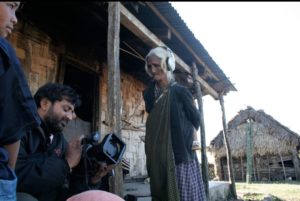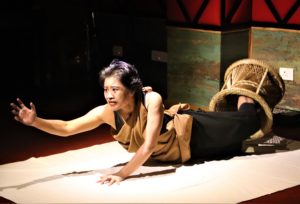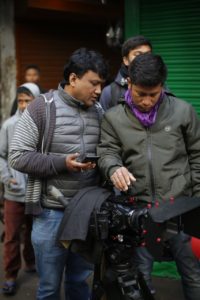By Esha Chaudhuri
Today is World Theatre Day! Observed annually, the day brings to the forefront the  significance and value of ‘acting’ in the entertainment industry and as a harbinger of change. The theme being “Theatre and Culture of Peace” this year, Sunday Shillong delves into the idea of ‘peace’ – garnering and fostering its essence among the populaces, through the stories of people. Speaking with some of the renowned names in the field, the quest to learn from their experiential journeys, the importance of drama, and its pivotal role in depicting stories of the unheard through engaging scripts is what we unravel through the amalgamation of all aspects of acting, scriptwriting, and directing especially from the realm of the Northeast.
significance and value of ‘acting’ in the entertainment industry and as a harbinger of change. The theme being “Theatre and Culture of Peace” this year, Sunday Shillong delves into the idea of ‘peace’ – garnering and fostering its essence among the populaces, through the stories of people. Speaking with some of the renowned names in the field, the quest to learn from their experiential journeys, the importance of drama, and its pivotal role in depicting stories of the unheard through engaging scripts is what we unravel through the amalgamation of all aspects of acting, scriptwriting, and directing especially from the realm of the Northeast.
Celebrating differences, stories of people
The arts are a forum wherein voices of difference, and ‘others’ find a space for expression. Enunciated through dialogues, visuals, facial expressions and bodily gestures, singing and dancing even, the world of acting has held a long standing place with its audience. Through its various enactments, the medium finds immense resonance with the people, thus resounding potential of transmitting the message of peace. Award winning thespian from the National  School of Drama (NSD) Delhi, Lapdiang Syiem cements this phrase by saying, “Theatre and Culture of Peace is a very important and significant theme especially in the times we are living in. For me, Art is a very powerful proponent of Peace. I remember a long time ago reading about the Freedom Theatre in Palestine and how it was a space for children to come together, make theatre and heal.”
School of Drama (NSD) Delhi, Lapdiang Syiem cements this phrase by saying, “Theatre and Culture of Peace is a very important and significant theme especially in the times we are living in. For me, Art is a very powerful proponent of Peace. I remember a long time ago reading about the Freedom Theatre in Palestine and how it was a space for children to come together, make theatre and heal.”
Through the articulation of these stories, apart from finding a connection with the masses, embracing individualities, and developing acceptance of plots distinctive of certain communities, it nurtures the essence of peace. Commenting on the day’s theme, renowned filmmaker and artist, Pradip Kurbah perceives, “The world at present is parched for peace. Ravaged by pandemic, extreme hostile takeovers of entire nations by fundamentalists, war, and a crumbling economy has caused a food crisis around the world; art could be the only refuge to heal and seek peace. Also, theatre is a very real and passionate way to tell stories and to connect with the audience at a very personal level.”
Art as a tool of propaganda
More often than not, just like the radio, other forums of art such as the cinema and theatre can be sometimes used as an object to fuel a certain agenda to shape the minds of an  impressionable audience. To this, Syiem says, “Art for me is political and should be so. However, I do not believe that art should be used for propaganda but, then again, that is my personal stand. Other artists might think otherwise. I think art should have the audacity to be honest and act as a mirror to society, fair in its assessment. I don’t believe in art that tries to divide. Art is creative and provocative. But art must strive to bring peace and dialogue.”
impressionable audience. To this, Syiem says, “Art for me is political and should be so. However, I do not believe that art should be used for propaganda but, then again, that is my personal stand. Other artists might think otherwise. I think art should have the audacity to be honest and act as a mirror to society, fair in its assessment. I don’t believe in art that tries to divide. Art is creative and provocative. But art must strive to bring peace and dialogue.”
With a differing point of view, prominent actor of the state, Merlvin Jude Mukhim explains, “A script, film, enactment and beyond may be seen as an agenda, reality, or just a story. For that matter, even propaganda. As an artist, my aim remains to stay focused on artistry, and to be remembered as a character within the gamut of imagination and perception of the audience.”
Elaborating on the intent of filmmaking, Kurbah states, “Using film or performances as propaganda tools is an old-fashioned tradition. Films and acting not only tell a story, it also reflects the filmmaker’s ideas of what is good and bad. Dividing races or castes is something that creative piece of work should never do. Several have done so in the past, and the results were almost always undesirable.”
Questioning the status quo, documentary filmmaker, Tarun Bhartiya interprets, “Every form of representation has an agenda or bias. This idea that there is some pure realm of a certain objective metaphysical truth is pure hogwash. I believe that texts that allow for engagement and probing, lasts longer and enter imaginations of people in much more creative ways.”
 NE in the Fringes
NE in the Fringes
Given that representative politics is a crucial aspect of visual and performative arts, people from the Northeast as well as other marginalised sections do not often find their desired space. Affirming the same, Syiem says, “There is a lack of content in scripts, plays, performances that have emerged from our region. My work looks at the adaptation and the reinterpretation of our oral culture, bringing Khasi folk narratives into a contemporary context. I find it so important to relook and delve into our memories to create work that resonates with who we are as a society, especially as a minority culture in the country.”
Emphasizing on harnessing talents from the peripheries, Mukhim says, “The idea about performing arts to me is that it must be encouraged to be more inclusive for the better. Just as any form of developmental initiative ought to be, where talent is recognised, and invigorated at every level, beginning at the grassroots. The talented children, youth and senior members of society must find space to showcase their gifts not necessarily urban centric, but the rural populace should also find the scope of possibilities.”
To stay alive and resounding, Kurbah says, “We need to keep telling our stories. The struggle to do that is immense, but the process shouldn’t stop. He further adds, “My experience says if you have a story that is worth watching or listening to, you will always find an audience.”
Commenting on the issue of representative politics, Bhartiya says, “Representation, whether cultural or political is about the question of power – who represents whom? Whose voices are acceptable? Which kind of representation the powerful want? So, the struggle to democratise representation and expression can not be separated from the struggle to democratise our  society itself.”
society itself.”
How can we do better?
To bring the field of acting and theatre to the fore, and give it a promotional boost, Syiem suggests, “So much! There is so much that can be done, from training institutions to building studio spaces and performance spaces with proper lights and sound that are accessible to artists and audiences, alike. The Department of Arts and Culture should invest in theatre training from the school level up and have ongoing dialogues with artists to understand where funding is needed, what activities to have and how to address the other challenges and needs of the artists and audiences. There is so much that needs to be done!”
Finding himself at crossroads, Mukhim expresses, “It is the entire governance mechanism and its dedicated departments with their laid-out mandates and schemes to realise its fruition. However, the bigger question is, are there any? If not, why not consult? Why not implement best practices which are available in plenty, across the North Eastern Region (NER) and the country as a whole?”
Observing the trajectory over the years, Kurbah states, “A solution is needed to this problem. Several discussions have ended with the same outcome but plans within governance need to come up with a viable solution.”
Performative arts, has long established a reputation for being a medium for peace and inclusivity through critical and highbrow engagement. As a member of the audience, learning from those in the profession whether a thespian, actor, scriptwriter or filmmaker, narrating their experiences, and portraying them through a quest for sincere depictions is truly an incredible experience.



